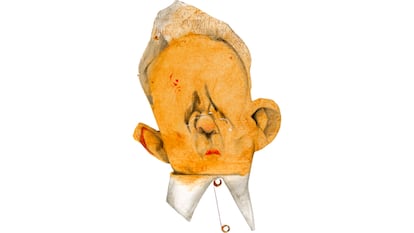The long agony of Álvaro Uribe
The former president of Colombia — who governed from 2002 until 2010 — is set to go on trial


Felipe González said — upon losing the 1996 elections in Spain — that former presidents are like delicate vases in tiny apartments: they’re said to have value and no one dares to throw them out… but, in reality, they only get in the way.
Most former heads of state tend to look towards a horizon filled with paid conferences at American universities, or sunny mornings with friends between holes on a green. But this isn’t the case when it comes to former Colombian President Álvaro Uribe who, at 71-years-old, lives in a state of anxiety and anguish.
Uribe is on track to become the first president in half-a-century of Colombian history to sit in a courtroom as a defendant. Since 2018, the former president has presented all kinds of appeals, in an attempt to avoid trial. He has been accused of witness-tampering and procedural fraud. However, this past Friday, the Superior Court of Bogotá denied the request of the Attorney General’s Office, which had insisted — for the third time — that there isn’t enough evidence to prosecute him.
Uribe’s star has faded as Colombia has changed course. When he governed from 2002 until 2010, he was an enormously popular president, who connected with people thanks to a tough security policy against armed groups. Some saw him (and still see him) as a war hero. His influence allowed him to handpick the next two presidents: Juan Manuel Santos (2010-2018) and Iván Duque (2018-2022). However, he felt betrayed by Santos — his former minister of defense — who signed a peace agreement with the FARC. And, when it came to Duque, Uribe ultimately distanced himself from his former political ally, when he realized that he didn’t have the necessary strength of character to govern effectively.

As Uribism began to decline, new sensitivities arose in the country. His nemesis — Gustavo Petro — came to power last year, with a project for change that’s nothing like Uribe’s. It’s a totally different perception of the country. The former president could have faded into the background… but that was never his nature. When he was a young congressman, at dawn, he would put his feet in a bucket of cold water to stay awake (and thus be able to work for longer hours). Uribe, simply, knows no other way than confrontation. But, in his struggle he picked a fight with the wrong man: Iván Cepeda.
In 2012, he filed a complaint against the senator before the Supreme Court, accusing Cepeda of allegedly plotting — with the use of false witnesses in prisons — to incriminate him in acts of paramilitarism. However, after six years, not only did the high court refrain from prosecuting Cepeda — it also decided to begin proceedings against Uribe, under the suspicion that he and his lawyers manipulated witnesses to make them retract the accusations made against the former president. Uribe was also accused of using his lawyers to get the witnesses to accuse Cepeda of attempting to slander him. Senator Cepeda — ever-meticulous and accustomed to political conflict — managed to flip the case around.
Today, Uribe is living in a kind of semi-retirement. He enters the public realm infrequently, only addressing his most fervent followers, who listen to him like a prophet. He doesn’t give interviews and always replies to this newspaper with the same single-word text message when asked to speak: “Prudence.” He — who is so concerned about his name in history — has appeared in the headlines from time to time in relation to the ongoing case, acknowledging that he will have no choice but to face trial.
Uribe has done everything possible to prevent this from happening… but he has fewer and fewer bullets left in the chamber. He resigned his Senate seat in 2020 to avoid being investigated by the Supreme Court. The case was left in the hands of the Attorney General’s Office, headed by Francisco Barbosa, who has made great efforts to have the file archived. He hasn’t succeeded.
Last year — in a move that caught everyone by surprise — Uribe accepted the hand that Petro extended towards him during his first few months in power.
They met on three occasions and — on at least one of them — Uribe’s legal situation was on the table.
At that time, Petro promised to unite the entire society around a common project. For such a national agreement to occur, he needs Uribe, who has a massive following among society at large and especially in the Armed Forces. A form of reconciliation would perhaps come in the form of a presidential pardon — although for that to be an option, one must first be convicted.
This shadow follows Uribe around in the autumn of his life. The president would undoubtedly have preferred to be a delicate vase.
Sign up for our weekly newsletter to get more English-language news coverage from EL PAÍS USA Edition
Tu suscripción se está usando en otro dispositivo
¿Quieres añadir otro usuario a tu suscripción?
Si continúas leyendo en este dispositivo, no se podrá leer en el otro.
FlechaTu suscripción se está usando en otro dispositivo y solo puedes acceder a EL PAÍS desde un dispositivo a la vez.
Si quieres compartir tu cuenta, cambia tu suscripción a la modalidad Premium, así podrás añadir otro usuario. Cada uno accederá con su propia cuenta de email, lo que os permitirá personalizar vuestra experiencia en EL PAÍS.
¿Tienes una suscripción de empresa? Accede aquí para contratar más cuentas.
En el caso de no saber quién está usando tu cuenta, te recomendamos cambiar tu contraseña aquí.
Si decides continuar compartiendo tu cuenta, este mensaje se mostrará en tu dispositivo y en el de la otra persona que está usando tu cuenta de forma indefinida, afectando a tu experiencia de lectura. Puedes consultar aquí los términos y condiciones de la suscripción digital.








































